|
|
|
Sort Order |
|
|
|
Items / Page
|
|
|
|
|
|
|
| Srl | Item |
| 1 |
ID:
117599
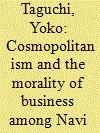

|
|
|
|
|
| Publication |
2012.
|
| Summary/Abstract |
Based on anthropological fieldwork, this article confirms that arguments about the decline of Mumbai's cosmopolitanism through the rise of regionalism and hindutva have failed to consider the idea of 'cosmopolitanism' as understood and used by local people, specifically local merchants. Reconsideration of cosmopolitanism in relation to regionalism focuses on the morality of business, as expressed by merchants in Navi Mumbai, is examined through two case scenarios. The Marathisation of signboards led by the Maharashtra Navnirman Sena (MNS) and participation in the Ganesh Festival show that their morality of business enables Navi Mumbai's merchants to adjust to various kinds of challenging phenomena, including those seen as regionalism. The same business morality, then, skillfully re-constructs the foundations of cosmopolitanism as a polyphonic folk term.
|
|
|
|
|
|
|
|
|
|
|
|
|
|
|
|
| 2 |
ID:
159394
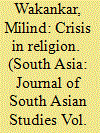

|
|
|
|
|
| Summary/Abstract |
The essay tries to understand how conversion to Christianity can transform language and its rhetorical possibilities inwardly. In the case of Jyotirao Phule, who was not a convert but was a critic of caste distinctions in nineteenth-century Western India, this meant that Marathi could now be used to uncover the link between Hindu apologetics and Brahmanism. Here I argue that the ‘humble’ Marathi used in missionary tracts made possible the emergence of the ‘I’ of the convert, and pushed ‘religion’ into the gap opened up in social life by a crisis of values, a crisis productively instrumentalised by Phule.
|
|
|
|
|
|
|
|
|
|
|
|
|
|
|
|
| 3 |
ID:
170470
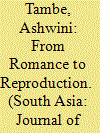

|
|
|
|
|
| Summary/Abstract |
This essay takes up for analysis how couples were represented in the cover art of the Marathi women’s magazine, Stree, from 1935 to 1965. Stree was the longest continuously running women’s magazine in Marathi (published from 1930 to 1986) and had a strong visual identity that benefited from cover images painted by noted artists. I focus here on a contrast that is evident between how couples were represented before and after Independence. Between 1935 and 1947, the hallmark image on the covers was the romantic couple, with alluring women as central figures. After Independence, between 1947 and 1965, the romantic couple receded from view and was replaced by scenes of comfortable and responsible mothering and domesticity. Depictions of premarital romance dropped, and women became components in a household tableau rather than the focus of romantic pursuit. In contrast with the Anglicised notions of glamour used in the 1930s, we also find a more explicitly Hindu aesthetic in the frequent representations of religious rituals and weddings. I treat these changing themes as an expression of the visual idiom of nation-building in mid twentieth century India. The increasing Hinduisation of couples in Stree covers reflects a post-Partition ethos of channelling conjugality along specifically majoritarian religious lines. The shunning of frivolity and the turn towards family and nation-building in this cultural text illustrates, in effect, how nationalism can shore up and promote very segregated gender relations.
|
|
|
|
|
|
|
|
|
|
|
|
|
|
|
|
| 4 |
ID:
175488
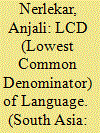

|
|
|
|
|
| Summary/Abstract |
The tumultuous politics of the post-Independence period in Bombay/Mumbai, and the creation of the linguistic states, released multiple and contradictory energies towards a re-examination of the Marathi language and its valence in linguistic, literary, social and cultural contexts. This essay employs the bilingual poetry of Arun Kolatkar and the Marathi-language poetry of R.K. Joshi to show the ways in which the sathottari poetry of Bombay engages with these socio-political questions of language and region by channelling the principles of concrete poetry and making the visual presence of the language (in its script, its lines, its presence on the page) a part of its meaning-making process.
|
|
|
|
|
|
|
|
|
|
|
|
|
|
|
|
| 5 |
ID:
175481
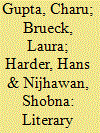

|
|
|
|
|
| Summary/Abstract |
This collection brings together nine essays, accompanied by nine short translations, that redraw the boundaries of literary histories both temporally and spatially. The essays, rooted in the humanities and informed by interdisciplinary area studies, explore multiple linkages between forms of print culture, linguistic identities and diverse vernacular literary spaces in colonial and post-colonial South Asia. The essays and translations foreground complex and politicised expressions of gender and genre in fictional and non-fictional print materials and thus draw meaningful connections between the vernacular and literature, the everyday and the marginals, and gender and sentiment. Collectively, they expand vernacular literary archives, canons and genealogies, and push us to theorise the nature of writing in South Asia.
|
|
|
|
|
|
|
|
|
|
|
|
|
|
|
|
| 6 |
ID:
190723
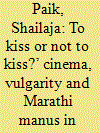

|
|
|
|
|
| Summary/Abstract |
Critiques of vulgarity, sexuality and class featured prominently in the social, cultural and intellectual life of post-Independence India. This article focuses on the discourse of chumban bandi (banning kissing) in the 1950s and 1960s Maharashtra and analyses how it became a particularly unique index of heightened transgressive pleasure. I situate this discourse within a larger public debate, where dominant caste middle-class elites took upon the responsibility to shepherd supposedly recalcitrant dominated castes and low-class masses towards decency, civilized action and citizenship. Many elites energetically worked on their ideology, which was rooted in high-caste, middle-class and patriarchal values to create Marathi manus and nation. Drawing upon hitherto neglected Marathi language texts, I show how elites policed the kiss to both ban on-screen kissing and paradoxically harness its energy to engage in the politics of Marathikaran (creating Marathi regional identity) and create a new Marathi identity as modern, moral and decent.
|
|
|
|
|
|
|
|
|
|
|
|
|
|
|
|
| 7 |
ID:
159388
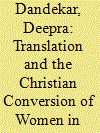

|
|
|
|
|
| Summary/Abstract |
This article foregrounds the interstitial and hybrid third voice of a nineteenth-century Christian convert in colonial India. Bala Shundoree Tagore, a Bengali woman and wife to the esteemed Gyanendra Mohan Tagore, was declared spiritually Christian by missionaries, even though she died before being baptised. Bala's narrative production by her biographers and translators obfuscated and transformed her voice, writing her into the history of Indian missions as a success story. Refashioned as a gendered symbol for Indian Christian women from the nineteenth century, Bala's narrative was utilised by missionaries by divesting her of the agency she possessed.
|
|
|
|
|
|
|
|
|
|
|
|
|
|
|
|
|
|
|
|
|